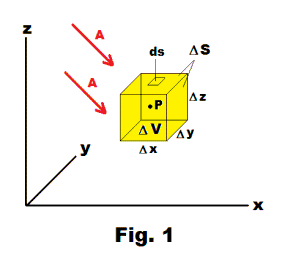
Website owner: James Miller
DIVERGENCE
Def. Divergence of a vector point function. Let A(x, y, z) = A1 (x, y, z) i + A2 (x, y, z) j + A3 (x, y, z) k be a vector point function that is defined and differentiable at each point (x, y, z) in a certain region of space. The divergence of A is a scalar point function defined as

The divergence can also be written, using the del operator, as


Def. Source. In hydrodynamics, potential theory, etc., a point in some region at which fluid (or flux) is created or introduced into the region. The strength m of a point source is the total flux of fluid from it.
Def. Sink. A point in a region at which fluid (or flux) is destroyed or disappears. The strength -m of a sink is the total flux of fluid into it.
Def. Flux strength. A measure of the flow of a fluid. It is equal to the amount of fluid passing through one square unit of cross-sectional area perpendicular to the direction of flow per unit of time.
Example. Water is flowing in a river at a rate of 3 feet per second. The amount passing through a one square foot cross-section perpendicular to the direction of flow is 3 cubic feet per second. The measure of water flow, viewed as flux, would then be given as 3 cu ft/sec per sq. ft.
Divergence. Physical interpretation. The divergence of a vector point function
A(x, y, z) = A1 (x, y, z) i + A2 (x, y, z) j + A3 (x, y, z) k
at some point P in a region R is a measure of the source or sink strength at point P. If the divergence is positive, then point P is a fluid (or flux) source and if it is negative P is a sink. If the divergence is zero, then point P is neither a source nor sink.
Let A be a vector point function defined throughout some region R of space. Then the divergence at any point P is given by


where A represents flux strength at point P, ΔV is the volume enclosed by the surface ΔS centered at P, n is the outward drawn unit normal at dS, and the limit is obtained by shrinking ΔV to point P. See Fig. 1 where ΔV is the volume of the depicted cube centered at P, ΔS is the surface of the cube, and ds is a differential element on ΔS. Physically

represents the net flux outflow per unit volume of the flux A from the surface ΔS. The quantity A∙n ds measures the rate of flow of the flux through the surface element dS.
If the integral
![]()
vanishes, there is no net outward flow. In this case any outward flux of A over part of the surface is balanced by an equal inward flux flow over the rest of the surface. If the integral is positive, the flux flow out of ΔV exceeds that into ΔV, and one says that there are sources within the volume. A negative value of the integral indicates the existence within ΔV of sinks, or points at which flux is being destroyed. If there are both sources and sinks within ΔV, the integral gives a measure of their algebraically combined strength. Thus div A can be taken as a measure of the source or sink strength at point P. If div A = 0 everywhere in a region, then there are no sources or sinks in the region and A is said to be a solenoidal vector field in the region.
Equation 2) can be taken as a definition of the divergence of A , and all the properties may be derived from it.
Continuity equation of an incompressible fluid. The equation
div A = 0
is called the continuity equation of an incompressible fluid. It states the condition that fluid is neither created nor destroyed.
References
Spiegel. Vector Analysis.
Hsu. Vector Analysis.
Angus Taylor. Adv. Calculus.
Jesus Christ and His Teachings
Way of enlightenment, wisdom, and understanding
America, a corrupt, depraved, shameless country
On integrity and the lack of it
The test of a person's Christianity is what he is
Ninety five percent of the problems that most people have come from personal foolishness
Liberalism, socialism and the modern welfare state
The desire to harm, a motivation for conduct
On Self-sufficient Country Living, Homesteading
Topically Arranged Proverbs, Precepts, Quotations. Common Sayings. Poor Richard's Almanac.
Theory on the Formation of Character
People are like radio tuners --- they pick out and listen to one wavelength and ignore the rest
Cause of Character Traits --- According to Aristotle
We are what we eat --- living under the discipline of a diet
Avoiding problems and trouble in life
Role of habit in formation of character
Personal attributes of the true Christian
What determines a person's character?
Love of God and love of virtue are closely united
Intellectual disparities among people and the power in good habits
Tools of Satan. Tactics and Tricks used by the Devil.
The Natural Way -- The Unnatural Way
Wisdom, Reason and Virtue are closely related
Knowledge is one thing, wisdom is another
My views on Christianity in America
The most important thing in life is understanding
We are all examples --- for good or for bad
Television --- spiritual poison
The Prime Mover that decides "What We Are"
Where do our outlooks, attitudes and values come from?
Sin is serious business. The punishment for it is real. Hell is real.
Self-imposed discipline and regimentation
Achieving happiness in life --- a matter of the right strategies
Self-control, self-restraint, self-discipline basic to so much in life